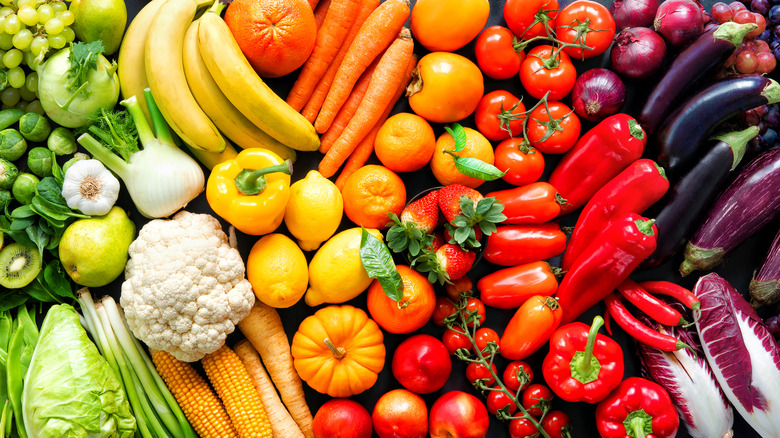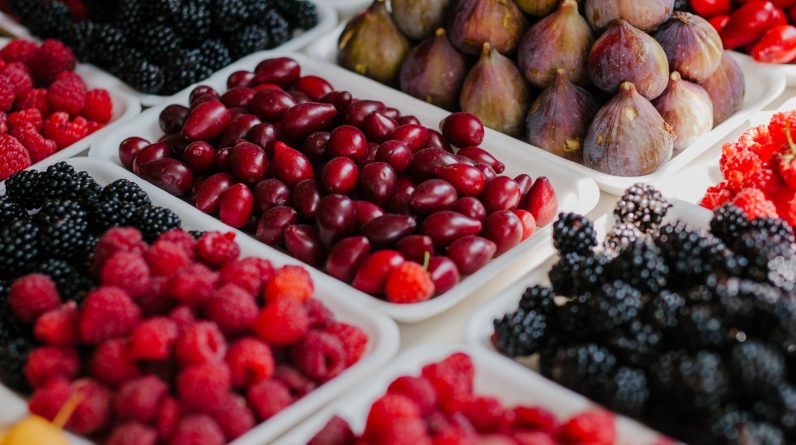
Benefits of Consuming 5 Daily Servings of Fruits and Vegetables: Discover Why You Should Adopt This Healthy Dietary Habit!
Eating about 5 servings of fruits and vegetables per day, with 2 servings of fruit and 3 servings of vegetables, is considered an ideal combination for a longer life. This is the latest finding from a new study published by the American Heart Association’s journal earlier this month Healthy Dietary .
Professor Dong Wang, an epidemiologist and nutrition expert at Harvard Medical School, and his team analyzed data from 26 studies involving nearly two million participants of both genders from 29 countries worldwide. They also conducted two studies involving more than 100,000 adults (66,719 women and 42,016 men) and followed them for three decades to investigate the relationship between fruit and vegetable consumption and mortality rates. The results consistently showed that consuming about 5 servings of fruits and vegetables daily is associated with a reduced risk of death.
Based on his team’s research, Professor Wang emphasized that everyone, both men and women, should consume fruits and vegetables daily, following the “5-a-day” guideline, as it is the optimal level of consumption supported by evidence for overall health.
strong evidence for the lifelong
Dr. Anne Thorndike, a professor at Harvard Medical School, stated that this research provides strong evidence for the lifelong benefits of consuming fruits and vegetables and suggests the specific quantity that should be consumed daily to maintain the health of our hearts and bodies. Therefore, the American Heart Association recommends filling at least half of your plate with fruits and vegetables in every meal.
Diets rich in fruits and vegetables offer numerous health benefits due to their vitamins, minerals, and important antioxidants, as well as being a good source of fiber. They reduce the risk of various chronic conditions that can lead to death, including heart and vascular diseases and cancer. Additionally, they can help lower blood pressure, maintain eye health, and support digestive health.
It is important to diversify the types of fruits and vegetables consumed because each type contains different nutritional elements and compounds. Dr. Lucy Chambers, a senior scientist at the British Nutrition Foundation, suggests eating a variety of fruits and vegetables to ensure you receive their full benefits.
The study also cautions that not all fruits and vegetables provide the same degree of benefits. Leafy greens like spinach, lettuce, and turnips, as well as fruits and vegetables rich in beta-carotene and vitamin C (known as “orange-red pigments”), such as carrots, peaches, cantaloupes, berries, and citrus fruits, are the most effective in achieving positive results. On the other hand, fruit juices and starchy vegetables like peas, corn, and potatoes may not offer the same benefits. The study also warns against expecting additional benefits from consuming more than the recommended five daily servings.
The Easiest Ways
Fresh vegetables and fruits are among the easiest ways to prevent diseases later in life, to the extent that American scientists suggest doctors should prescribe them, stating that “this will ultimately save more money than preventive medications.”
However, it appears that many good pieces of advice are often ignored. The study revealed that individuals who consumed five servings of fruits and vegetables daily experienced a 35% reduction in the risk of respiratory diseases, a 12% decrease in the risk of heart and vascular diseases and stroke, and a 10% lower risk of cancer compared to those who only consumed two servings.
Nevertheless, data from the Centers for Disease Control and Prevention (CDC) indicates that only one in ten individuals eats the recommended amount of fruits and vegetables daily. Only 12% of adults in the United States eat enough fruit, while only 9% consume enough vegetables, with lower-income individuals having the lowest rates of consumption.
As a reminder, a serving of fruit is a medium-sized piece (e.g., an apple) or half a cup of canned fruit or a quarter cup of dried fruit.
A serving of vegetables is a cup of leafy vegetables as a meal, or half a cup of fresh, canned, or frozen vegetable pieces.
Tips
For more enjoyment of fruits and vegetables as a wonderful way to improve your health, here are some tips from Harvard School of Public Health:
Experiment with Variety: Try different types of fruits and vegetables to discover new flavors and textures. Don’t limit yourself to just a few; explore the wide array of options available.
Incorporate Colorful Options: Vibrant and colorful fruits and vegetables are not only visually appealing but also rich in various nutrients. Include a variety of colors in your diet to ensure a diverse nutrient intake.
Seasonal Selections: Opt for seasonal produce whenever possible. They are often fresher, more flavorful, and may be more affordable.
Fresh or Frozen: Fresh fruits and vegetables are fantastic, but frozen options are also nutritious and convenient. They retain their nutrients and can be stored for more extended periods.
Make Smoothies:
Blend fruits and vegetables into delicious smoothies for a refreshing and nutritious beverage.
Add to Salads: Toss in a mix of fresh vegetables and fruits into your salads to make them more exciting and satisfying.
Healthy Snacking: Keep cut-up fruits and vegetables readily available for quick and Healthy Dietary snacks.
Explore Different Cooking Methods: Experiment with various cooking techniques like roasting, steaming, grilling, or stir-frying to find out which flavors you prefer.
Use as Toppings: Add fruits like berries or sliced fruits to your cereal, yogurt, or desserts as natural and tasty toppings.
Involve the Family: Engage your family in choosing and preparing fruits and vegetables. This can be a fun way to bond while instilling healthy eating habits in everyone.
Plant a Garden: If you have space, consider growing your fruits and vegetables. It’s a rewarding way to ensure freshness and also engage in physical activity.
Healthy Desserts: Use fruits to createHealthy Dietary , like fruit salads or baked fruits with a touch of honey or cinnamon.
Remember, the goal is to make fruits and vegetables a regular part of your daily diet, and by incorporating these tips, you can enjoy them more while reaping their numerous health benefits.
Is Juice Better?
Some people believe that consuming juice is better than eating whole fruits and vegetables because the body can absorb the nutrients better, and it spares the digestive system from processing fiber. They also add that juice may help with weight loss. However, there is no scientific evidence that juices are healthier than consuming whole fruits or vegetables.
Catherine Zeratsky, a nutrition specialist at the Mayo Clinic, says, “Juice is not healthier than eating whole fruits and vegetables. Although juice contains most of the beneficial vitamins and minerals, it deprives us of Healthy Dietary . Harmful bacteria can also grow quickly in fresh juice.”
When it comes to the nutritional value and health benefits, whole fruits and vegetables are generally better than fruit juices.
Here’s why
- Fiber Content: Whole fruits and vegetables contain dietary fiber, which is essential for digestion, helps regulate blood sugar levels, and promotes a feeling of fullness.
- Calorie and Sugar Content: Fruit juices can be high in calories and sugar. When you consume whole fruits, the fiber helps slow down the absorption of sugar, preventing rapid spikes in blood sugar levels. Juice, lacking the fiber, can lead to faster absorption and potential blood sugar fluctuations.
- Satiety: Drinking fruit juice may not be as filling as eating whole fruits, which can lead to overconsumption of calories.
- Nutrient Loss: The juicing process can result in the loss of some nutrients, especially sensitive vitamins like vitamin C. Whole fruits and vegetables retain their nutrients better.
- Hydration: While fruit juices do provide hydration, they may not be as effective as plain water or eating whole fruits, which contain water along with the fiber and nutrients.
- Dental Health: Fruit juices can be acidic and contain natural sugars that may contribute to dental issues when consumed frequently.
Diet occasionally
However, it’s essential to choose 100% pure fruit juices without added sugars, and to keep portion sizes in check.
For maximum health benefits, focus on consuming a variety of whole fruits and vegetables daily. They provide a more comprehensive package of nutrients, fiber, and other beneficial compounds that contribute to overall well-being. If you want a beverage alternative to water, you can also try infusing water with slices of fruits or herbs for added flavor without the drawbacks of concentrated juice. Healthy Dietary
Why You Should Eat Five Servings of Fruits & Vegetables Each Day
Consuming five daily servings of fruits and vegetables offers numerous health benefits due to their rich nutrient content. Here are ten advantages of including these nutritious foods in your diet:
- Improved Nutrient Intake: Fruits and vegetables are excellent sources of essential vitamins, minerals, and antioxidants, which are vital for maintaining overall health and well-being.
- Weight Management: Fruits and vegetables are low in calories and high in fiber, helping you feel full and satisfied while managing your weight effectively.
- Digestive Health: The fiber content in fruits and vegetables promotes Healthy Dietary digestion and helps prevent constipation.
- Heart Health: Certain fruits and vegetables, like berries, leafy greens, and citrus fruits, can improve heart health by reducing cholesterol levels and supporting Healthy Dietary blood pressure.
- Blood Sugar Control: The low glycemic index of many fruits and vegetables helps regulate blood sugar levels, making them beneficial for individuals with diabetes or those at risk of developing the condition.
- Cognitive Function: Antioxidant-rich fruits and vegetables may support brain health and cognitive function, reducing the risk of age-related cognitive decline.
- Immune System Support: The vitamins, minerals, and antioxidants in fruits and vegetables strengthen the immune system, helping the body fight off infections and illnesses.
- Skin Health: The high water content and various nutrients in fruits and vegetables contribute to healthier, radiant skin.
- Hydration: Fruits and vegetables have high water content, aiding in hydration and maintaining overall fluid balance in the body.
Remember, the more diverse the colors and types of fruits and vegetables you consume, the wider range of nutrients you’ll obtain, contributing to better health and vitality.






